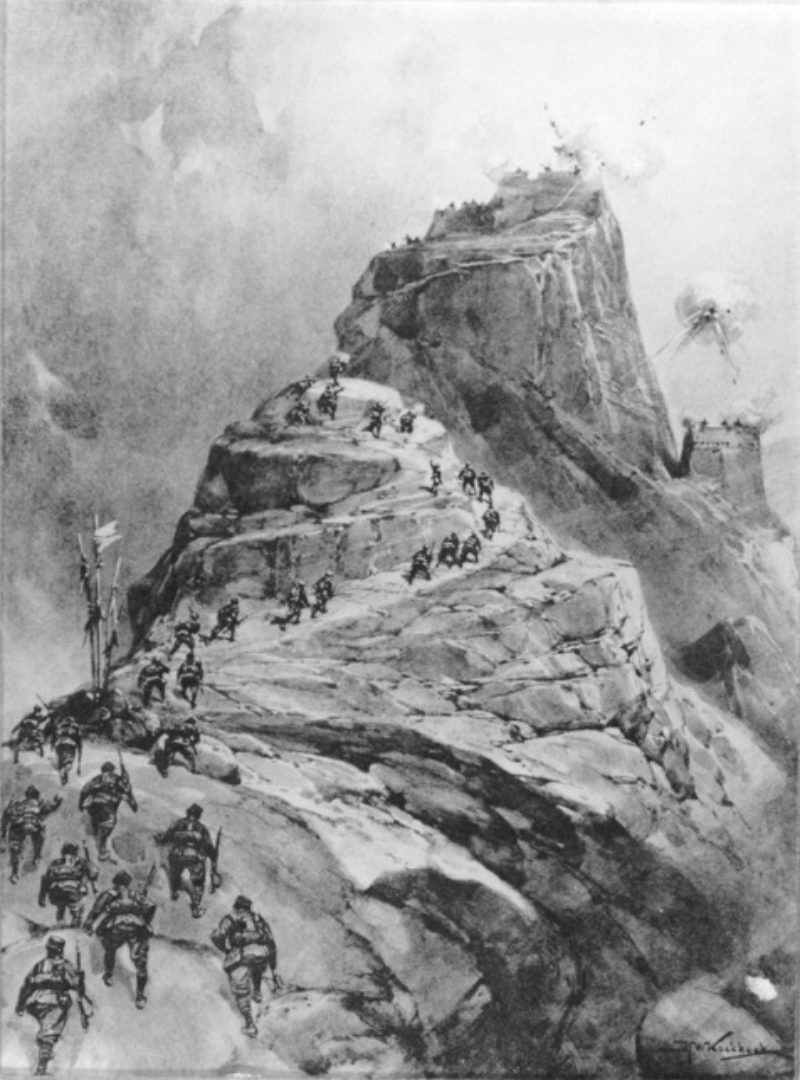A Victoria Cross in Tibet – Gurkhas and Mountain Warfare – Lieutenant John Duncan Grant

A Victoria Cross in Tibet – Gurkhas and Mountain Warfare – Lieutenant John Duncan Grant
Gurkhas have many traits and many skills that set them head and shoulders above their counterparts in the battle. Coming from the hilly country of Nepal, skills in mountain warfare are one of them. The below story tells how the mountain warfare skills of a Gurkha solider and officer, won a close fought battle between Gurkhas and Tibetan soldiers. With Grant and Havildar Pun’s bravery and skills eventually taking the fortress of Gyantse Jong.
At the close of the 19th century the tension between Britain and Russia over control of Central Asia, commonly referred to as ‘The Great Game’, had begun to calm, with politics and détente taking the place of military actions and explorer-spies. However, by 1903 Tibet, nominally under the control of Imperial China, was perceived by British officials and diplomats to be slipping from under weak Chinese authority into the sphere of influence of Russia. Though the likelihood of Tibet becoming a Russian satellite state remained low, these fears, coupled with Tibet’s severe isolationism towards all foreigners and refusal to engage with British and Indian trade rules, inspired the British officer and explorer Francis Younghusband to push for a military expedition to march into Tibet, reach the capital city of Lhasa and force the Tibetan government to agree to new trade terms and reject Russian political interference.
The Tibet Expedition left from Sikkim on December 11th, 1903, and made its way steadily north. The Tibetan army, though brave and motivated by a belief in the orders of the Tibetan Dalai Lama, was seriously outclassed in terms of military equipment and training and by 11th April the British force had reached the fortress of Gyantse Jong, in the central Tibetan plain. Gyantse, an ancient and extremely well-built citadel, perched on top of a giant rock outcrop, was a lynchpin of the Tibetan defence, contained the country’s only artillery, and was widely believed to be impregnable amongst the Tibetan forces.
Despite having brought artillery themselves, Younghusband and the British force did not wish to attempt a storming of Gyantse if they could help it, and the force camped uneasily around Gyantse until early July, as diplomatic and political messages passed back and forth between Tibet, China, India and the forces on the ground. On July 3rd negotiations collapsed, with some later accusing Younghusband of being overly eager to get to Lhasa at all costs, and thus refusing to negotiate seriously, and on July 6th the British force advanced to storm the Gyantse Jong.
Leading the assault alongside one company of the Royal Fusiliers were two companies of the 8th Gurkha Rifles. The expeditions Gurkha troops had been instrumental in nearly all the fighting in the campaign up to this point, clearing valley tops and defensive positions ahead of the main force on multiple occasions, and the hope was that their endurance and skill in steep assault work would prove invaluable on the sheer slopes and faces of the Jong. The attack dragged on for much longer than was expected, with two of the three assault columns running into each other in the darkness of the early morning offensive. It took nearly 12 hours for the Gurkhas to get into a position where they were able to attempt a final climb up to a breach made in the fort’s walls by British artillery.
Finally, a party of Gurkhas, led by Lieutenant John Grant and Havildar Karbir Pun scaled the 30 or so feet up sheer rock wall towards the artillery breach. Both men were wounded by missiles and rocks thrown down by the defending Tibetans above them, and both lost their footing and fell more than once, (Grant having fallen almost the entire height of the climb, after being wounded and thrown down by a Tibetan soldier after reaching the ramparts).
After a serious effort the pair managed to again reach the ramparts and forced a breach in the Tibetan defences, allowing their following troops to climb up and take the fort. With Gyantse Jong taken, the Tibetan army fell back and the British force advanced unimpeded to Lhasa, obtaining the concessions the British sought and ending any chance of Russian influence in Tibet. This effectively converted the country into a de-facto British protectorate with the signing of the Treaty of Lhasa in September 1904.
Lieutenant Grant was awarded the Victoria Cross for his heroism, whilst Havildar Pun received the Indian Order of Merit First Class.

